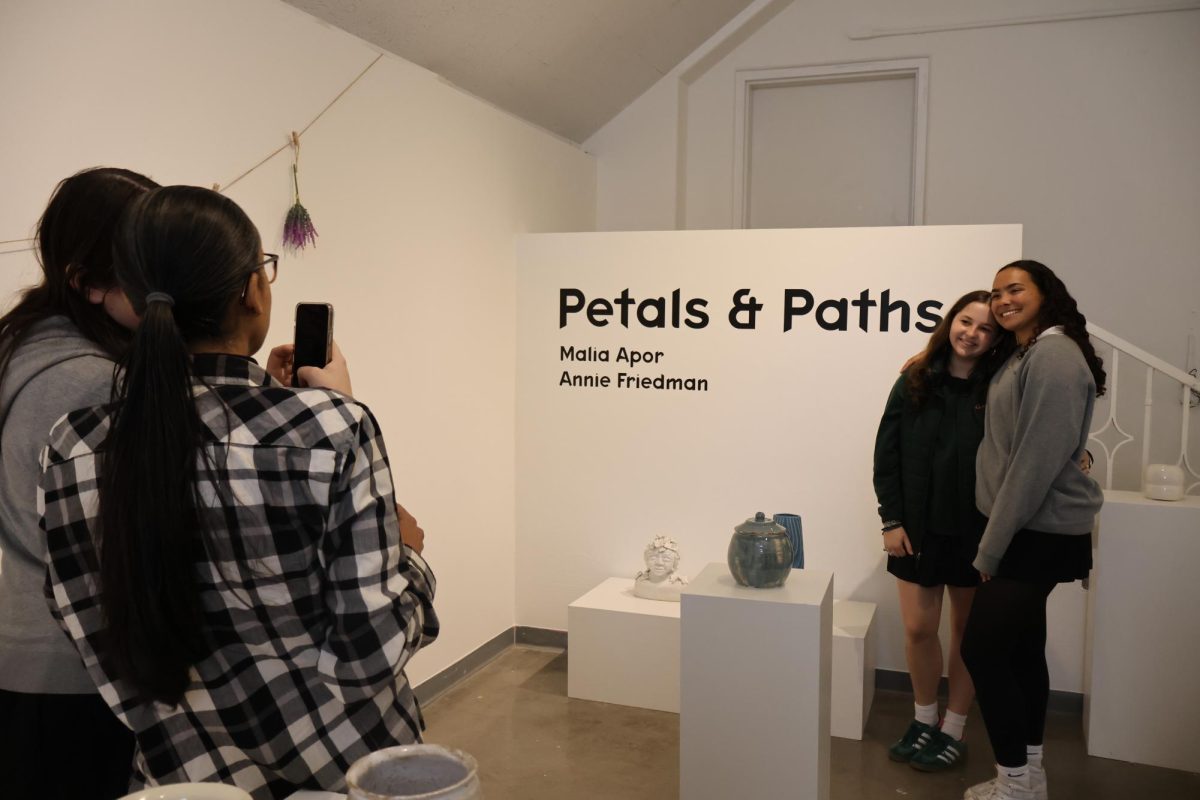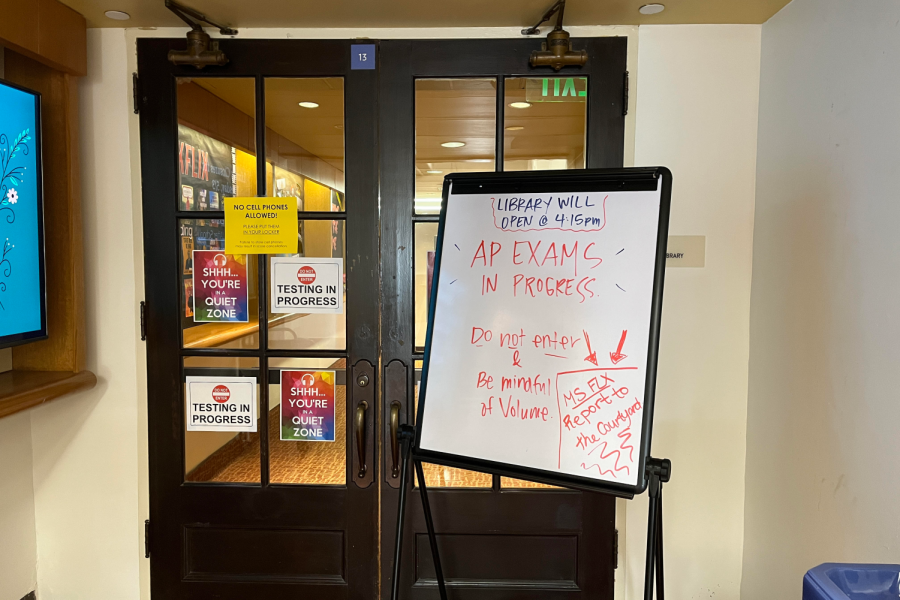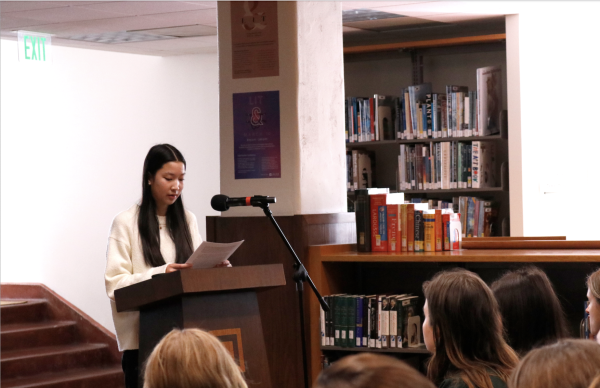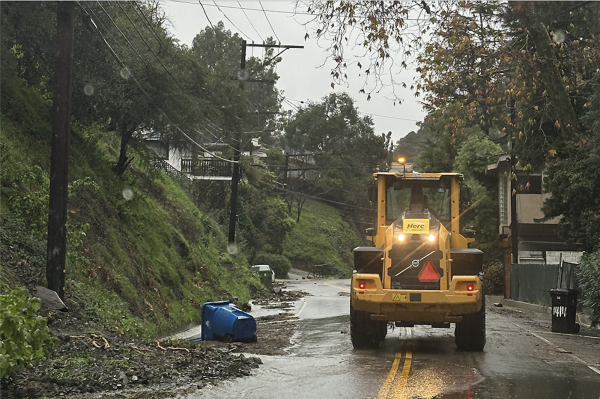Students prepare for annual Advanced Placement Exams, reflect on last time testing
Photo credit: Cadence Callahan
A sign posted in front of the Tia Palermo library informs students of Advanced Placement Exams taking place inside. Students began taking the AP Exams May 2, a set of annual assessments administered by The College Board. These will be the last set of exams administered by Archer as the school plans to phase out Advanced Placement courses and assessments next school year.
May 15, 2022
Pencils, pens and highlighters. Textbooks and past assignments piled high. Archer’s junior, senior and select sophomore students prepared for their last set of AP exams ever, as the school will phase out of Advanced Placement courses and testing next year.
The Advanced Placement exams are a series of yearly assessments administered by The College Board in conjunction with high schools across the country. The exams assess students on various subjects, such as mathematics, English and language.
Junior Helen Solis took the AP English Language and Composition Exam May 10, and in preparation for this assessment, her class reviewed and answered sample questions and prompts.
“During class, we answered practice prompts in groups and individually, focusing on timing when writing and answering questions,” Solis said. “Outside of class, I would review our past material. We did some review first semester, but now that the exam is approaching, we’re going back and reviewing old work.”
College guidance counselor Ivan Hauck said he has seen the pressure exams add for certain students towards the end of the year.
“Because it is a culminating event — a culminating test that supposedly tests all knowledge throughout the year — I see how it adds an element of pressure to students in feeling this need to ‘earn’ a score,” Hauck said. “There’s also just sitting in a room for three to five hours taking a test that is exhausting. Those are the main ways I see AP exams impacting our students.”
The loss of AP exams is going to open up more doors — we are already seeing it in students talking about courses for next year and the diversity of electives students can take.
— Ivan Hauck, college guidance counselor
Most of the exams are being administered during the weeks of May 2 and May 9, and are being held in the Tia Palermo library, dining hall and offices in the college guidance hallway. These areas are closed for students who are not testing for the duration of the exam.
Each exam ranges from three to four hours long, with extra time being allocated to students who require it, and will take place throughout the day. Per an email sent from the administration, students who are testing are still required to attend their regularly scheduled classes when they are not taking an exam.
Solis said she experienced bouts of stress while preparing for the exam, but found relief talking through her nerves with fellow peers.
“I am experiencing a little anxiety because this will be my first AP exam, and I know it’s a long test with multiple parts to it,” Solis said. “When I am feeling stressed, I take time off to not think about the assessment, listening to music, and if I do have questions, I talk about my anxiety with other people. I’ve also found studying in groups to be very helpful.”
Hauck said when students originally learned of the plan to replace AP courses and exams, there was confusion. After speaking with him and other counselors, Hauck said he believes students are looking forward to the greater opportunities for learning in the future.
“I think as we’ve progressed in the last couple of months, and students have heard from Mr. Farley, the teachers, our office and college admissions people, I think students and families are hearing the same message that things are not just going to be okay, but they will be better in the long term,” Hauck said. “What I am seeing — especially right now because students are stressed out about AP testing — it’s like, ‘Oh, if there are going to be more options and greater opportunities to learn, and we don’t have to stress out about major tests at the end of the year, it’s a win-win all around.'”
Junior Maya Kakani took the AP English Language and Composition Exam as well as the AP Calculus AB Exam, and unlike Solis, said she did not experience any major stress prior to taking the exam.
“I want to do as well as I can, but at the same time, I don’t want to study too much or put too much pressure on myself,” Kakani said. “Anytime I do get stressed, I try to remind myself that the score I get isn’t a big deal, and if I do get a good score and I’m able to get out of some college courses, that’s great, but at the same time, I don’t need that. So I try to remind myself that the exam isn’t as big as a deal as it’s sometimes made out to be.”
Despite her nerves, Solis said she was motivated in her AP English Language and Composition classroom and inspired by her teacher to do her absolute best on the exam.
“I have Ms. Bergen, and she’s definitely supportive. In class, she’ll show us sample work and encourage us by saying we’re all capable of producing that quality work — we just have to have confidence in ourselves and write in the way we’ve been practicing,” Solis said. “She’s told us that she believes we’ll all do well, and has been motivating and encouraging us every step of the way.”
Hauck said he is relieved that these will be the last series of AP exams Archer requires students to take, and is excited to see how this will increase educational interest and curiosity.
“It’s just so freeing to know that you all will be able to take the classes you want to take, to explore research projects that you get excited about,” Hauck said. “For our end, it’s both relieving and we see it as an empowering opportunity to allow you to grow in future years.”





![Freshman Milan Earl and sophomore Lucy Kaplan sit with their grandparents at Archer’s annual Grandparents and Special Friends Day Friday, March 15. The event took place over three 75-minute sessions. “[I hope my grandparents] gain an understanding about what I do, Kaplan said, because I know they ask a lot of questions and can sort of see what I do in school and what the experience is like to be here.](https://archeroracle.org/wp-content/uploads/2024/03/grandparents-day-option-2-1200x800.jpg)
























































![Freshman Milan Earl and sophomore Lucy Kaplan sit with their grandparents at Archer’s annual Grandparents and Special Friends Day Friday, March 15. The event took place over three 75-minute sessions. “[I hope my grandparents] gain an understanding about what I do, Kaplan said, because I know they ask a lot of questions and can sort of see what I do in school and what the experience is like to be here.](https://archeroracle.org/wp-content/uploads/2024/03/grandparents-day-option-2-600x400.jpg)




